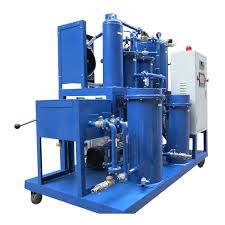Keeping The Oil Rust-Free With Oil Purification Machines
Engine oil is the lifeblood of any machine. It provides vital lubrication to prevent excessive friction and wear on moving parts. But over time, oil can become contaminated with dirt, moisture, fuel dilution, and metallic particles that accelerate corrosion and rust formation. If left unchecked, rust particles circulating in your oil can quickly damage sensitive components like hydraulic pumps, servo valves, turbines, and more. That's why installing an Oil purification machine for the antirust oil is essential for extending equipment life and avoiding catastrophic failures.

How Rust Forms In Oil?
Several factors cause rust to form in oil:
- Water ingress – Moisture contamination is unavoidable over time. Small amounts of water will find their way into the oil via condensation and microscopic leaks. Water provides the essential hydrogen ions needed for rust formation. Even small concentrations of 100-200 ppm can begin corroding components.
- Oxidation – Hot running temperatures combined with oxygen bubbles incorporated during circulation oxidize the oil. This makes it more acidic and reactive with metallic surfaces.
- Wear particles – Normal component wear produces fine metallic debris of iron, copper, chromium, nickel, and other alloys. These particles activate and accelerate the rusting process.
- Environmental dust – External dust and debris infiltrate the oil through defective air breathers and seals. Dirt provides nucleation sites for rust formation.
- Acid byproducts – Chemical breakdown of oil produces organic acids and sulfur compounds that destabilize additives, making the oil more corrosive.
The Dangers Of Rust Contamination
What may begin as microfine rust particles quickly avalanche into a serious contamination problem. Here are some of the damaging effects of rust in oil:
- Blocked filters and screens – Rust particles clump together and restrict vital flow to pumps, valves, and precision instruments. Loss of filtration can lead to additional component failures.
- Increased wear and scoring – Hard rust particles act as abrasives, rapidly wearing bearing surfaces, gears, piston walls, etc. Scuffing and pitting degrades clearances and performance.
- Stuck valves and sticking pumps – Rust deposits prevent servo valves from shifting positions properly. Vane and gear pumps will seize from particulate ingestion.
- Acidic oil – Rust chemically destabilizes oil additives and promotes the formation of acidic compounds that corrode soft alloy metals like copper, tin, and lead.
- Reduced heat transfer – Rust sludge insulates and prevents proper heat dissipation, leading to detrimental hot spots in hydraulic systems, gearboxes, engines, etc.
Clearly, rust can wreak havoc in your equipment if not promptly removed. Investing in an oil purification system is the most effective way to combat rust contamination.
How Oil Purification Machines Eliminate Rust
Oil purification systems use a multi-stage process to remove rust and other particulate contaminants down to micron levels. Here are the key stages:
- Pre-Filtration: A conventional pressure filter captures larger debris above 5 microns. This extends the service life of downstream components.
- Magnetic Separation: Powerful rare earth magnets extract ferrous particles like iron rust. The oil is exposed to an intense magnetic field to pull out contaminants.
- Centrifugal Separation: The purified oil feeds into a high-speed centrifuge that generates thousands of Gs to force out dense rust particles, dirt, soot, and moisture. Centrifugal action is highly efficient for achieving ultra-low contamination levels.
- Polish Filtering: As a final polishing step, the oil passes through a micro-fiber filter medium capable of removing particles down to 1 micron or less. This super-finished oil can then be returned back into service.
Additional options like vacuum dehydration and acid removal filters can be incorporated as needed based on oil analysis results. The modular, building block design allows customization for different oil types and contamination levels.
Benefits Of Rust Removal Systems
Installing a dedicated oil purification machine provides numerous benefits:
Extended oil life – Removing rust allows oil additive packages to better protect against oxidation and acid formation. Oil lasts longer before requiring replacement.
Reduced wear and downtime – Clean oil prevents accelerated wear, scoring, and corrosion inside components. Equipment suffers less damage and unplanned downtime.
Improved reliability – Tart, acidic oil gets rejuvenated back to optimum lubricity and anti-wear performance. Smoother, trouble-free operation results.
Decreased maintenance – Rust removal reduces labor hours spent unclogging filters, replacing damaged parts, and rebuilding worn components.
Avoid costly disposal – Purifying rusty oil eliminates the need for premature change-outs. Less oil gets wasted.
Safer operation – Eliminating valve sticking and pump seizures prevents dangerous machine failures that can harm workers.